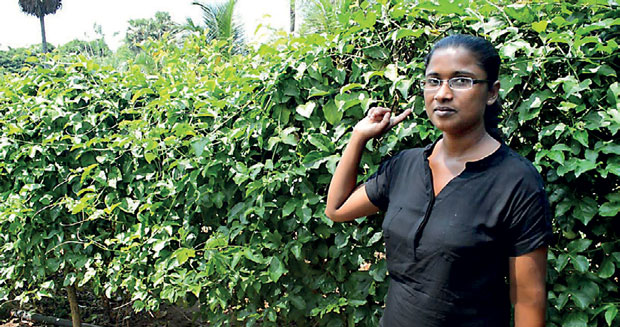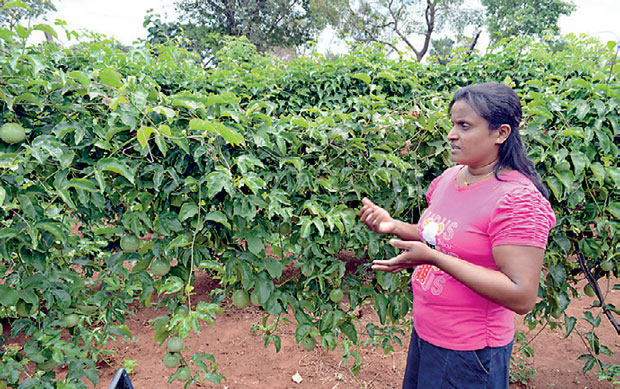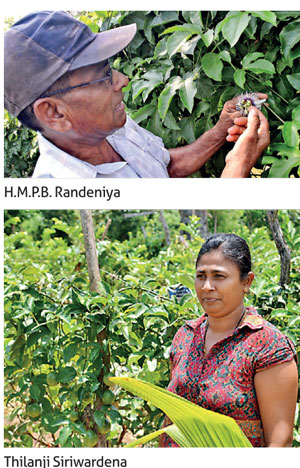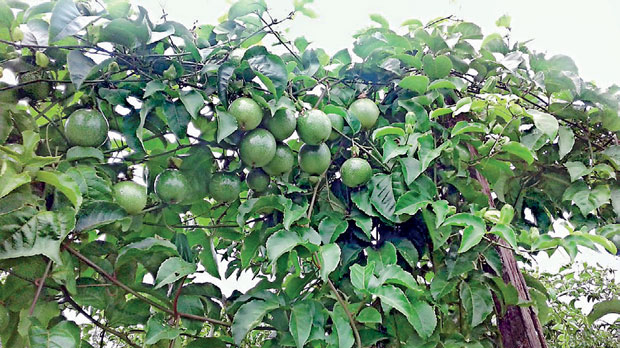14 Jul 2017 - {{hitsCtrl.values.hits}}
 Samadi Hettiarachchi
Samadi Hettiarachchi
 Dakshina Disna
Dakshina Disna
 Commercial cultivation of passion fruits in dry rural villages around Sri Lanka’s North-Central Province of Anuradhapura is fast turning into an economic ‘game changer’ transforming the livelihoods of hundreds of poor families in overcoming poverty.
Commercial cultivation of passion fruits in dry rural villages around Sri Lanka’s North-Central Province of Anuradhapura is fast turning into an economic ‘game changer’ transforming the livelihoods of hundreds of poor families in overcoming poverty.
According to farmers engaged in cultivation of passion fruits, the crops once harvested deliver a steady yield on a weekly basis, after an initial growth period of six months and is therefore deemed a highly reliable source of income. On the other hand, due to the lucrative nature of the investment, it has made a sustainable impact on livelihoods especially amongst the less privileged persons who choose to make productive use of idle land.

In Ipalogama, a remote town 44 kilometres away from Anuradhapura, the man behind popularizing the cultivation of the commercial crop was E.M.J. Ekanayake, the Enterprise Development Officer of Berendina Microfinance Institute (Gte) Ltd (BMI), a leading poverty-alleviation agency in the microfinance sector. The gentleman has been credited for training and nurturing over 150 lay persons to become agro-entrepreneurs in the field of passion fruit cultivation.
“In 2012, during the time I was attached to Berendina’s Thirapone branch, I came to know that about two to three persons in the area, who engaged in cultivation of passion fruits earlier on, had abandoned cultivation due to a lack of professional guidance and technical expertise.
“Therefore, our institution mooted a linkage with a private organisation named Laymen’s Den to conduct training programmes recognizing the lucrative nature of investment,” Ekanayake said.
He added that initially, although around 60 people participated in the training session, only about 20 people recognized its viability and ventured into the programme.
Following the success of the peers, more and more people joined and today the number of passion fruit farmers has increased to about 154, the official from Berendina said.
Training is key
“In 2013, I was introduced to the programme by officials from Berendina’s Ipalogama branch, who enrolled me into a training session on passion fruit cultivation conducted by a private company. Since I had no prior technical knowledge on cultivation, these training sessions were the cornerstone to my entrepreneurial success today,” said 48-year-old H.M.P.B. Randeniya, a farmer who lives in a remote village in Yakkallegama, off Eppawela, with his wife and two children.
Randeniya noted that Berendina, through its linkage created with few private companies, had provided him around 100 saplings for plantation at the conclusion of the training programme.
“This proved to be a major turning point in my life as the crops bore bountiful results for my efforts. Thanks to this venture, today I have been able to purchase household goods and educate my children without much hassle,” elaborated Randeniya.
However, he underscores that the success or failure of a venture will be determined by how well one is able to implement the acquired training and skills to the letter through sheer hard work and determination.
“The key to success here is to perfectly put into practice the knowledge acquired from the training programme,” he opined.

Income
On the economic front, Randeniya stated that prior to venturing into passion cultivation, he had earned a meagre income of Rs.8,000 a month by utilizing his available land for banana cultivation although today he is able to generate an additional income of Rs.41,000 a month through passion cultivation.
“In 2015, I obtained a microfinance loan of Rs.75,000 from BMI to cultivate passion fruits and this loan helped me to successfully cover the cost of planting and maintaining over 200 passion vines,” he said.
Through the income earned from passion fruit harvests, Randeniya elucidated that today he has been able to build his house while also leasing out a new plot of land to cultivate passion fruits.
Advantages
On the other hand, Samadi Hettiarachchi–a resident of Kadiyangalla, elaborated that one of the key advantages of passion cultivation is that it involves very little hard labour and thus could be easily managed even by women during the day-time while the men are out at other work. Utilizing the income from passion fruits, Hettiarachchi had recently opened a new poultry and farm shop and is also now pursuing an external degree.
“Passion fruit is also a non-traditional crop for our villagers who have been generally used to cultivate dry-zone crops like cowpea, mung bean, vegetables, etc. Due to its unconventional nature there is a heavy demand for both local consumption and exports and hence the fruit fetches a premium price,” Hettiarachchi said highlighting the crop’s main competitive advantage.
She further noted that as passion fruit farming allows intercropping, crop diversification can be easily achieved depending on the seasonal nature of demand for other crops.
Challenges
The cultivation is however, is not without its own challenges. Dakshina Disna, a married woman from Ipalogama, is today a female entrepreneur having acquired the business acumen from scratch. She has planted about 200 passion vines with a half an acreage of land and through the income she generated, has also recently diversified into plantation of anthurium plants.
However, she argues that the need for manual pollination, pruning, frequent irrigation and marketing of the harvest are few of the challenges she is acquainted with.
“Flowers start to bloom when the sun is at its peak daily between 12 noon and 2:00 p.m. This is when pollination has to be done manually, which can be tiresome if you are not fit enough. Pruning is also an essential practice whereby you need to remove old and excess branches to increase the flower and fruit production,” she said.
She further noted that although generally the vines need to be irrigated at least once in 10 days, this becomes a challenge during a period of drought as this has to be done more frequently.
“Watering the plants can become a daunting task with the inadequate level of water resources in the area. If the vines are not watered adequately, it can directly impact the volume of harvest or income earned,” Disna, who obtained a water connection through a loan from Berendina, pointed out.
However, she explained that one could easily overcome the challenge if there is an efficient rainwater harvesting system deployed.
She also highlighted that although access to better technology like high pressure water pumps and sprinklers could ease off some workload, it may however not be affordable in the long run with the water bills taking a pinch on their incomes.
Pests and diseases
Meanwhile, Thilanji Siriwardena, another housewife who owns an acreage of passion plantation, said the main advantage of planting the crop is because the vines due to their non-acidic nature, tend to have little to zero pests and are therefore less prone to diseases. Hence, she reckons, it is the key reason for its wide popularity and success in the region.
On the other hand, Siriwardena underscored that marketing of the harvest could be a burden since in some cases, buyers paid a lower price when they are asked to be collected as opposed to fruits which are delivered at their marketplace.
“These days, although the market price at the Dambulla Economic Centre is well over Rs.120 a kilogram, there are private collectors around the area who would only pay a lower rate of Rs.80/a kilogram in comparison,” she lamented.
She however articulated that the rate is reasonable given that she does not have to bear costs involved with transportation (including cost of unforeseen damages) and therefore is anyway a convenient way of disposing her harvest.
Moreover, Siriwardena noted that even in the case of Dambulla market, there are also those picky traders who insist on the grading of fruits and are engaged in the practice of ‘picking and choosing’ fruits they purchased.
“With the collectors here, we however do not come across such issues,” said Siriwardena, who had purchased a motorcycle through the income earned from passion fruits, on a concluding note.
07 Jan 2025 7 hours ago
07 Jan 2025 7 hours ago
07 Jan 2025 8 hours ago
07 Jan 2025 07 Jan 2025
07 Jan 2025 07 Jan 2025